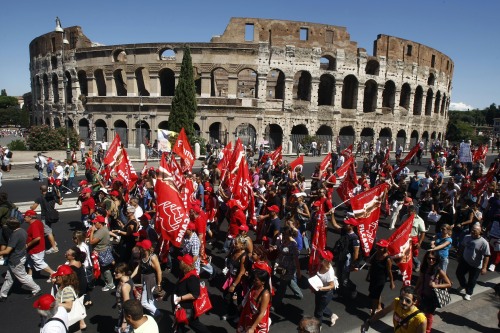ROME (AP) ― Italy’s Senate approved Premier Silvio Berlusconi’s disputed austerity package Wednesday, ending weeks of uncertainty that roiled financial markets unsure that the government was serious about cutting its deficit and avoiding becoming Europe’s next debt crisis victim.
The upper chamber voted 165-141 with three abstentions to approve the package, which the government put to a confidence vote to ensure Berlusconi’s allies united behind him after weeks of bickering over details of the plan.
 |
Demonstrators march past the Colosseum during a general strike in Rome on Tuesday. (AP-Yonhap News) |
The proposal now goes to the lower Chamber of Deputies, where Berlusconi’s allies also maintain a majority.
The final package aims at reducing the country’s deficit by more than 54 billion euros ($70 billion) over three years through budget cuts, tax hikes and changes to the country’s costly pension system. Italy’s deficit to GDP ratio now stands at 120 percent, one of Europe’s highest.
Had the vote failed, Berlusconi would have been forced to resign, a prospect lawmakers clearly wanted to avoid given the nervousness with which financial markets have already viewed Italy’s flip-flopping proposals and ability to balance the budget by 2013.
The European Central Bank had demanded stiff austerity measures to calm the markets, but it’s not clear whether the package passed Wednesday is sufficient. The ECB has spent billions over the last month buying up Italian government bonds to get Italy’s borrowing costs lower and help them avoid becoming the next eurozone nation to need an international bailout.
“We did our job,” proclaimed Maurizio Gasparri, head of Berlusconi’s party in the Senate, after the vote, saying the “robust” package should assure markets and the ECB.
The package was bitterly opposed by Italy’s main labor union, which staged a general strike on the eve of the vote. A few dozen protesters launched smoke bombs in front of the parliament building Wednesday.
Lawmaker Angelo Bonelli of the opposition Greens said the plan targeted Italy’s weakest, saying they were “shouldering the brunt of the crisis.”
Finance Minister Giulio Tremonti’s office confirmed Wednesday that the final changes in the plan, including pension reform that had been resisted by Berlusconi’s coalition allies, significantly increases the dent in Italy’s deficit. Italian media reported the latest new taxes and spending cuts totaled 4 billion euros ($5.7 billion).
When the deficit-battling package was first unveiled Aug. 12, the package added up to 45.5 billion euros ($64.1 billion). But weeks of waffling by squabbling coalition allies whittled down the new or higher taxes and spending cuts, further shaking the markets’ confidence, and the government beefed up the measures at a Cabinet meeting Tuesday.
“The decisions taken yesterday by the Cabinet have strengthened the measures significantly,” Antonio Azzollini, the head of the Senate’s budget committee, told the assembly.
Azzollini, from Berlusconi’s party, said sales taxes on goods and many services would be raised from 20 percent to 21 percent, an additional income tax of 3 percent would be on levied on incomes exceeding 300,000 euros (nearly $450,000), and the timetable for raising the retirement age for women would be speeded up from 2016 to 2014.
Berlusconi had originally shied away from putting the package to a vote of confidence in his government, but decided to speed up its passage after ECB president Jean-Claude Trichet, during a visit Saturday, appealed for quick, decisive action to save Italy’s credit reputation.








![[Today’s K-pop] Blackpink’s Jennie, Lisa invited to Coachella as solo acts](http://res.heraldm.com/phpwas/restmb_idxmake.php?idx=644&simg=/content/image/2024/11/21/20241121050099_0.jpg)